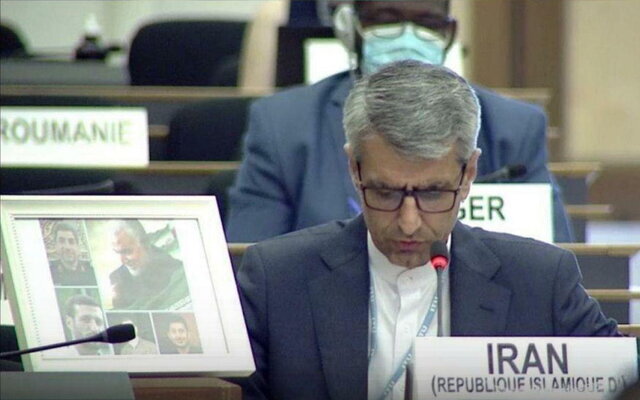TEHRAN - Esmaeil Baghaei Hamaneh, Iran’s ambassador and permanent representative to the UN office in Geneva, has said that no country at a meeting of the UN Human Rights Council on Thursday supported the assassination of Iranian Lieutenant General Qassem Soleimani by the United States.
In an interview with Al Mayadeen, Hamaneh also said the Europeans did not support the U.S. terrorist act.
Ambassador Hamaneh also said that the UNHRC’s meeting about Soleimani was very important.
A UN human rights investigator said on Monday that the U.S. assassination of Soleimani was a “violation of the UN Charter”.
The U.S. has failed to provide sufficient evidence of an ongoing or imminent attack against its interests to justify the strike on Soleimani’s convoy as it left Baghdad airport, said Agnes Callamard, the UN special rapporteur on extrajudicial, summary or arbitrary executions.
"Maj. Gen. Soleimani was in charge of Iran military strategy, and actions, in Syria and Iraq. But absent an actual imminent threat to life, the course of action taken by the US was unlawful," Callamard wrote in the report.
Callamard's report on targeted killings through armed drones - around half of which deals with the Soleimani case – was presented to the UN Human Rights Council session in Geneva on Thursday.
Ambassador Hamaneh said it was for the “first time” that the UN special rapporteur in her own capacity gave a report at the venue of the United Nations Human Rights Council about the “criminal terrorist act” against General Soleimani.
The ambassador said, “We all know that it is for many years that the U.S. is using drones for committing terrorist acts, but what makes this operation, that we consider it a kind of state terrorism, different from others is that the U.S., for the first time, targeted a senior military commander of a sovereign country who was visiting another sovereign country.”
The Iranian ambassador to the UNHCR added, “This is a new phenomenon and great danger.”
The ambassador said, “We all know that it is for many years that the U.S. is using drones for committing terrorist acts, but what makes this operation, that we consider it a kind of state terrorism, different from others is that the U.S., for the first time, targeted a senior military commander of a sovereign country who was visiting another sovereign country.”
The Iranian ambassador to the UNHCR added, “This is a new phenomenon and great danger.”
He noted that Soleimani was a top ranking official and Iran has the right to pursue his assassination through judicial bodies.
On whether after the Thursday session the Soleimani issue has turned into an international issues, he said, “The assassination of General Soleimani turned into an international issue from the very first moment.”
“It was an unprecedented move against a country’s independence and sovereignty,” he said, adding it is for many years that the U.S. conducts secret operations to topple governments “but open assassination of a state official and then expressing proud over it is unprecedented.”
The ambassador went on to say that “we believe that this action sounded the alarm about the approach and course of international relations, to the extent that most countries were asking whether we are heading toward lawlessness in international relations or that only the law of jungle shapes relations between countries.”
On January 3, U.S. President Donald Trump ordered airstrikes that martyred General Soleimani and Abu Mahdi al-Muhandis, the second-in-command of Iraq’s Popular Mobilization Units (PMU), in Baghdad’s international airport.
Soleimani was recognized internationally as a legendary commander in the war against terrorist groups, especially Daesh (ISIS).
Benjamin Friedman, from George Washington University's Elliott School of International Affairs, said the killing could be construed as an act of war.
"This attack is different from all the drone strikes because it targeted a senior figure in Iran's government," he told Al Jazeera. "It seemed like an act of war and an assassination."
Tehran Prosecutor General Ali Alqasi-Mehr announced on June 29 that 36 individuals, including Donald Trump, have been identified in connection with the assassination and Interpol has been notified to arrest them.
Tehran Prosecutor General Ali Alqasi-Mehr announced on June 29 that 36 individuals, including Donald Trump, have been identified in connection with the assassination and Interpol has been notified to arrest them.
“36 individuals who cooperated, collaborated, and participated in the assassination of Hajj Qassem, including political and military authorities of the U.S. and other countries, have been identified,” he stated.
The prosecutor general explained that Trump is at the top of the list, and he’ll be facing prosecution even after his term as president.
TAGS


No comments:
Post a Comment